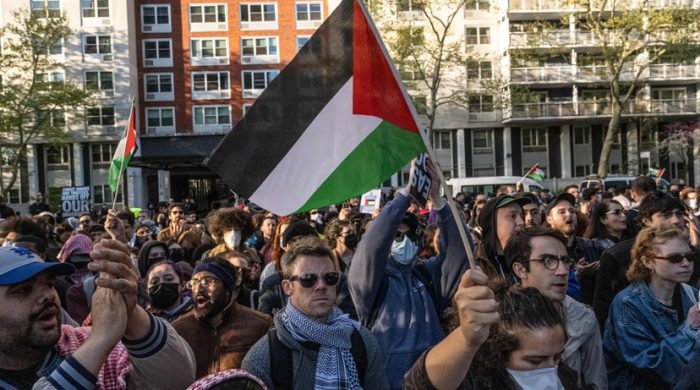Hamas said it was studying on Saturday the latest Israeli counterproposal regarding a potential ceasefire in Gaza, a day after a delegation from mediator Egypt reportedly arrived in Israel in a bid to jump-start stalled negotiations.
The signs of fresh truce talks came alongside ongoing Israeli preparations for a military push into Gaza’s southern city of Rafah and as spillover from the war led to continued attacks across the region.
“Today, the Hamas movement received the official Zionist occupation response to the movement’s position, which was delivered to the Egyptian and Qatari mediators on April 13,” Khalil al-Hayya, deputy head of Hamas’s political arm in Gaza, said in a brief statement early Saturday.
“The movement will study this proposal, and upon completion of its study, it will submit its response.”
There has been “noticeable progress in bringing the views of the Egyptian and Israeli delegations closer”, said Al-Qahera News, which is linked to Egyptian state intelligence services.
The war in Gaza was also on the agenda for an international summit set to kick off in Saudi Arabia over the weekend.
The World Economic Forum special meeting, scheduled to begin in Riyadh on Sunday, will include a Gaza-focused session on Monday set to feature newly appointed Palestinian Prime Minister Mohammed Mustafa, Egyptian Prime Minister Mostafa Madbouly and Sigrid Kaag, the United Nations aid coordinator for the Gaza Strip.
“Discussions with European, American and regional counterparts on Gaza and the regional situation are planned in Riyadh,” a diplomatic source said Friday.
‘Miracle’ baby dies
Witnesses in besieged Gaza reported fresh Israeli strikes overnight into Saturday around Rafah, the last urban centre Israeli ground forces have yet to enter.
Plans for an Israeli incursion into the city, which military leaders say is necessary to uproot Hamas battalions, have sparked opposition among the international community due to the presence of hundreds of thousands of displaced civilians seeking refuge there.
Senior Hamas official Ghazi Hamad told AFP on Thursday that such an operation “will undoubtedly threaten the negotiations” and show “that Israel is interested in continuing the war”.
The war began with the unprecedented Hamas attack on October 7, which resulted in the deaths of about 1,170 people in Israel, mostly civilians, according to an AFP tally of Israeli official figures.
Israel’s retaliatory offensive has killed at least 34,356 people in Gaza, mostly women and children, according to the Hamas-run territory’s health ministry.
Israel estimates that 129 hostages are still being held by Hamas in Gaza, including 34 the military says are dead.
On Friday, missiles fired from an Israeli jet hit Gaza City, killing at least three people in the Rimal neighbourhood, an AFP reporter said.
“I was sitting selling cigarettes and suddenly a missile fell, shaking the whole area,” a witness who did not give his name told AFP, adding that the bodies of a man, a woman and a little girl were pulled from the rubble.
Meanwhile, a baby delivered from her dying mother’s womb in Rafah on the weekend has died, the girl’s uncle said. When she was born, doctors hailed her as a “miracle”.
But Rami al-Sheikh told AFP on Friday that his niece Ruh had “joined her family in the gardens of eternity”, after her mother was fatally wounded in an Israeli strike.
‘Hands off Rafah’
Opposition to an Israeli military operation in Rafah extended to university campuses across the United States, where hundreds of students have been arrested at pro-Palestinian protests.
“Stop the invasion! Hands off Rafah!” said a sign at a pro-Palestinian encampment at George Washington University in the US capital.
Israel’s military offensive has turned vast swathes of Gaza into rubble, creating 37 million tonnes of debris that will take years to clear away, according to the UN Mine Action Service.
The World Food Programme has warned that famine is “a real and dangerous threat” in Gaza.
The European Union said Friday it was giving an extra $73 million in aid to Palestinians in Gaza “in light of the continued deterioration of the severe humanitarian crisis”.
Israel minister in crash
The Gaza war has led to increased violence between Israel and Iran’s proxies and allies, in particular the Iran-backed militant group Hezbollah along the border with Lebanon.
The Israeli army said Friday that a civilian was killed by anti-tank missiles fired towards “the area of Har Dov”, which refers to the disputed Shebaa Farms border district.
Also on Friday, the Lebanese Islamist group Jamaa Islamiya said an Israeli strike in eastern Lebanon had killed two of its senior commanders.
In response to what it called a “cowardly assassination”, Hezbollah said it launched dozens of rockets at two military posts in northern Israel.
And in the Red Sea, a tanker was damaged when it was targeted with multiple missiles off Yemen’s coast on Friday, in the latest attack on international shipping in the Red Sea to be claimed by Iran-backed Huthi rebels.
Near Tel Aviv, an 18-year-old woman was seriously wounded in a stabbing attack and the assailant was killed at the scene, according to paramedics and police.
After addressing journalists at the scene, Israel’s far-right National Security Minister Itamar Ben Gvir was involved in a car crash in which three people were lightly injured, police said.

















